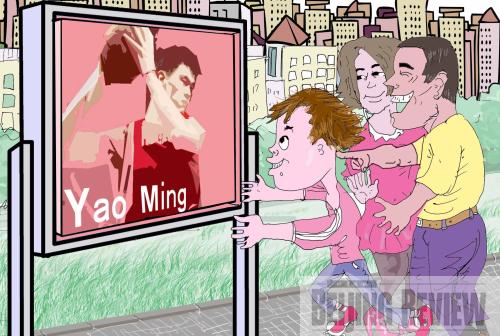|
 |
|
LI SHIGONG |
In the United States, Americans are constantly focusing their attention and admiration on successful people. Everyone avidly reads about and talks about popular stars, musicians and heroes. Michael Phelps, Madonna, and President Barack Obama are just a few examples of American celebrities who are watched constantly in the United States. They and others like them represent the core essence of American attitudes toward success: Ordinary people who have transformed themselves into ideal elites in sports, in music, in politics. All of these people have climbed the social ladder and reached the pinnacle.
In China, heroes and Horatio Alger-type stories are also popular. Chinese novels, stories, operas, movies and legends are filled with rags-to-riches stories, ranging from the poor but diligent scholar who makes good on his imperial exams to beautiful concubines who dedicate their lives to their country.
But Chinese and Americans treat the concept of success differently. For example, when an American achieves great success, usually his town will have a street or a building named after him. Two famous examples are the Kennedy Airport and Roosevelt Boulevard. But in China the reverse is true. Traditionally, a successful man would change his name to reflect his hometown origins, thus identifying himself with his origins. Such a vast cultural difference reflects the American predilection toward individualism and the Chinese preference toward the group. The two cultures demonstrate lone success versus group success.
When Chinese people succeed they want to shine in front of their family, friends and peers, because a web of mutual interdependence runs throughout all Chinese relationships. For Chinese heroes, glory belongs to everyone they are connected to: family, ancestors, villagers, country.
Triumphant Americans don't usually relate their success closely to others because the American dream is based on the rugged loner pulling himself up by his own bootstraps. Although sports heroes may be encouraged by coaches or parents, Americans view them as succeeding independently. Because of this those who do well want the public to be aware of their triumph, not just insiders. American athletes and movie stars enter an elite class of celebrities, transforming themselves into public commodities. Because these stars are always expected to rise higher and top others, while their lives entertain and transfix the American public.
In comparison to Americans, Chinese celebrities seem muted and low key. Chinese stars want and retain more privacy. Scandals, love lives and personal idiosyncrasies are not part of public media hype. Moreover, when Chinese stars go in public representing a movie or a charity, they often go as a group. Much ceremonial pomp is displayed to honor both the celebrities and the event.
Certainly Chinese people experience hero worship. Chinese fans are loyal to their favorite celebrities, but fundamental cultural differences influence the way Chinese and Americans behave toward them. For example, Americans respect, admire and strive to personally identify with a celebrity; they want to emulate as well as revere. Chinese, on the other hand, prefer to just revere and respect a hero or a success; generally, they do not engage as much emotionally as the Americans. Perhaps Chinese fans are more pragmatic and secure in their social stations; few would believe that they wanted to, or could achieve the same position as an extraordinary Chinese celebrity.
Americans, in contrast, belong to a culture that espouses equality for all. Culturally, Americans have great emotional needs to succeed and be better than others, so they project their hopes and fantasies upon their heroes and celebrities. They want to be like their heroes, and they perceive their heroes as individuals, rather than as representatives of privileged stations in life.
But Chinese do have heroes who have inspired them personally and as a nation to accomplish great things. Chairman Mao Zedong was such a man. His incredible rapport with the Chinese people still baffles foreigners, who misunderstand him, especially his amazing feat of swimming across the Yangtze River. This event made him the first great Chinese leader to attempt such an arduous physical challenge, and the deed reduced the psychological distance between him and ordinary Chinese people. Many Chinese friends have taken me to the exact spot where Chairman Mao crossed the Yangtze. As a former swimmer, I wouldn't dare to try to make this crossing.
Today's Chinese heroes behave traditionally while simultaneously adapting to global changes. Leaders appear in public to give instructional speeches. Chinese government leaders do not act like public entertainers, as many American leaders must do. Instead, they maintain their privacy and dignity, following precedents upheld by the ancient emperors. Their duty is to be responsible, kind, just and fatherly to the Chinese people, dutiful to their own parents, and good to their neighbors. Understanding this fundamental difference in political presentation may promote better diplomatic relations between the two countries.
The writer is an American living in Beijing |
